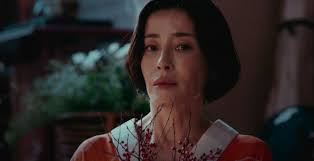Asura Review 2025 Tv Show Series Cast Crew Online
Asura is a retelling of the Japanese novel Like Asura, written by Mukoda Kuniko. The story, which has also been told in an acclaimed 2003 film, centers on the four Takezawa sisters, who discover their elderly father has had an affair.
The series begins as Takiko, the youngest sister, unmarried and spinster-like, finds out about the affair after seeing her father, Kotaro (Jun Kunimura), his mistress and a boy she assumes is their young son together. Despite not having seen her sisters in some time, she gathers them together to let them know, but their responses are not what she had hoped for. Her older sister Makiko (Machiko Ono) and Makiko’s husband instruct Takiko not to tell their mother any of what she’s learned. Sakiko (Suzu Hirose), the most immature and impetuous sister, blames Takiko for stirring up drama because she’s unhappy with her own life. And the oldest sister, Tsunako (Rie Miyazawa), a widow who teaches flower arranging, doesn’t seem to know how to process it.
Takiko has unknowingly created a cascading effect throughout her family with this information because, with this news on all of her sisters’ minds, their lives start to unravel. Makiko, whose husband was adamant that they just ignore the affair, finally begins to acknowledge that her husband is also being unfaithful. Her husband, Takao (Masahiro Motoki) starts going to great lengths to conceal his father-in-laws misdeeds, from trying to get the private investigator to bury all his proof, to even approaching Kotaro and asking him to hide any evidence of the affair. Kotaro, though remorseful, has no intention of hiding anything though, he is defiant that if the truth is out there, he will own it.
And while everyone scrambles to figure out how to handle the affair, Kotaro’s wife Fuji, the one who stands to lose the most from this, secretly discovers the affair after finding a toy car in Kotaro’s pocket one day, the confirmation of a long-held suspicion she’s had. (She hurls the toy at a wall, creating a hole, something that she ultimately can’t hide, though she never admits to anyone else that she knows the secret.) Despite the fact that everyone in the family knows about the affair now, no one discusses it and life goes on. But individually, the sisters and their parents are all grappling with their own personal issues and secrets that, had it not been for their dad’s affair, they probably would have been content to tamp down forever.
While on the surface Asura comes off as a family-focused soap opera filled with secrets, lies, affairs and tragedies, there is a deeper cultural commentary lurking below. It takes place in 1979, when more women still felt relegated to the home and indebted to their husbands in many ways (not that these ideas don’t still exist now), but it was still a time when women lived in a man’s world and had to abide by men’s rules. By confronting – or wishing to bury – their father’s affair, the sisters’ motivation is to protect their mother, but inevitably, they all have to confront the problems of their own lives, many of which are rooted in men having power over them, and their complicated feelings about that.
The show’s name, Asura, comes from the concept of Buddhist and Hindu power-seeking demigods, and each of the sisters is meant to represent these figures, each one of them unique, with a rich and complicated backstory, but also trying to learn how to come into their power. The father’s affair, while the basis for all of the family drama, gives way to much more complex character studies of each daughter and those around them, and these characters are at once archetypes but also truly individual and layered. Despite the gravity of their situations, the sister are often silly, having fun with one another (especially oldest sisters Makiko and Tsunako), which adds a much-needed lightness to themes that would make their plights too daunting. These complex performances and realistically woven story threads are the backbone of a drama that’s not simply a soap opera, but a delicately balanced story of the plight of women. Not simply women who are cheated on, but all women who are forced to comply with – or defy – whatever is expected of them due to age, class status, duty, or anything else.




